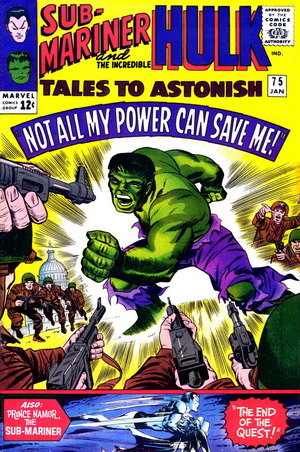
Published: January, 1966
Script: Stan Lee
Layouts: Jack Kirby
Illustrations: Mickey Demeo
Letters: Sam Rosen
This issue begins with one of my favorite moments in Marvel Comics so far. Following the progression of Hulk, I have sometimes been confused regarding the scope of his powers, and whether he is hero, villain…or something in-between. The writers often seem uncertain exactly what to do with Hulk, so I’ve been wondering when and how his character will finally “gel.” Even now, there are still so many unanswered questions, but in this issue, it is Hulk himself who is asking the questions.
Having recently retired from the Rat Race (dramatics: it was not that bad…), I find myself in a position to do whatever I want. I, of course, had many months to think this through, and as an obsessive planner, I’ve mapped out things extensively on a massive To-Do List. Hulk, on the other hand, is unexpectedly thrown into his current situation, when the Leader, to whom he owes a debt, dons the accursed Ultimate Machine helmet…and immediately drops dead. Though feeling no remorse, Hulk notes that he is no longer beholden to anyone; he is his own man once again. “I’m free…” he reflects, but then, in what can only be imagined as a tone of confusion and exasperation, adds, “to do WHAT??”
EXISTENTIAL CRISIS
This feels more like an existential crisis than anything Hulk has yet experienced. This is not toddler Hulk, angrily exclaiming “Hulk smash!” But it’s also not the Bruce Banner voice of reason still buried deep within his psyche, advising him to assist the good guys and strive for justice. Here, Hulk is simply a semi-cognizant being, suddenly asking himself, “If I could do anything in the whole wide world…what would I do?”
The strain of this question seems too much to bear, because almost immediately he embarks on a path of reckless behavior. He could have listened to his inner Banner, but chooses against that path, for he realizes he is now separating from Banner more and more, and he likes it that way.
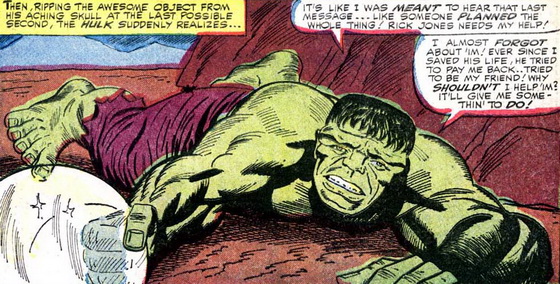
However, when Hulk hears Rick Jones, he realizes Jones is a friend and decides to help him. A good-guy activity, to be sure…but he makes this decision not because of friendship, but more so because “it’ll give me somethin’ to do!” Somethin’ to fight and smash! This is Hulk’s comfort zone, and he falls right back into it.
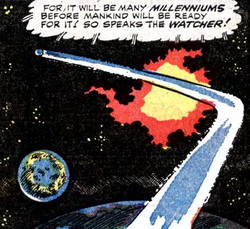 MEN BEHAVING BADLY
MEN BEHAVING BADLY
After causing the death of the Leader, the Ultimate Machine goes back to the Watcher, who comments, “It will be many millenniums [sic] before mankind is ready for it.” Human fascination with technology is so overwhelming that curious—and greedy—souls, like the Leader, are anxious to try something new and exciting, without first determining the consequences. And now, even after Hulk has witnessed the Leader sent to his doom by this overwhelming technology, yes, even now, he also is STILL willing to try it! With no clear scientific proof for his reasoning, Hulk figures his thicker skin will protect him. He’s taking a big chance. Is Hulk a gambler, and if so, by nature or nurture? Or is he just too depressed and wrapped up in his existential crisis to give a damn what happens to him? Either way, he cannot resist pushing that button. 
All that being said, for Hulk, who lives a life full of danger and has only himself to worry about, this reckless risk may not actually be that big of a surprise. But he isn’t the only one in this story pushing a button without knowing what might happen next.
A SHOT IN THE DARK
Led by General “Thunderbolt” Ross, the military has come into possession of Bruce Banner’s impressive T-Gun. Looks like it packs a punch…but they have never tested it and honestly, they have no idea what it does. Yet Ross gives the command to use it on Hulk because “it’s the only thing that may STOP him!” His emphasis is on “STOP,” but should really land on “MAY.” Ross is willing to risk everything to destroy Hulk. Are his priorities out of whack, 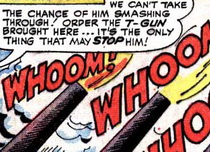 or is this the inevitable conclusion of a grudge match between two strong macho personalities?
or is this the inevitable conclusion of a grudge match between two strong macho personalities?
TIME TRAVEL
But let’s back up a bit. T-Gun. Why in the world did Banner even build a device that was never meant to be used? He was trying to learn if a blast that alters light waves could send a person into a different time. It appears the answer is “Yes!” for our reluctant hero is transported to the future—where Washington, DC has been destroyed, and the local inhabitants hail Hulk as “he, of whom our ANCIENT legends tell!”
Time Travel is back, baby! After completing last year’s 1965 Awards, I realized Time Travel had not been a major theme that year, but here it is once again, and I’m actually surprised at how excited I am to see it. Dystopian society much? Bring it on!
BUTTERFLY EFFECT
So…Hulk recklessly dons the Ultimate Machine headwear, and General Ross shoots off a super-weapon with no idea of the consequences. But who in this story is more reckless than the Watcher? He interferes yet again, not knowing what will happen. He, who should know better! After all, his entire philosophy is that he does not interfere, he only watches. He knows that if he interferes, he might change the course of history. I’m assuming The Watcher has read the chapter in his Watcher’s Manual regarding the potentially devastating impact of the Butterfly Effect. And yet, time after time…after time, he continues to break his own rule. You know the saying: “You had ONE JOB!!” The Watcher has only one job. But I don’t think I’ve ever seen him in a story doing only what he says he is supposed to do, i.e. WATCH.
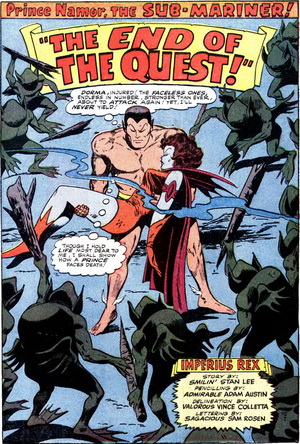 “The End of the Quest!”
“The End of the Quest!”
Script: Stan Lee
Pencils: Adam Austin
Inks: Vince Colletta
Letters: Sam Rosen
But now let’s turn the page to the other story in this issue. Sub-Mariner’s saga provides a comforting contrast to what’s happening on the surface world. As seen in the previous issue, Namor decided to rescue Dorma from the Faceless Ones, rather than continue his quest for the Trident, which would assure the return of his kingdom. Bold choice…but is it reckless—as reckless as the behaviors blindly chosen by those in Hulk’s world?
One is immediately reminded of Spock’s logic that “The good of the many outweighs the good of the one.” Yeah, that Spock is a good talker, isn’t he? But when push comes to shove, he actually chose to save Kirk’s life. Sacrificing himself in the process. So, to some degree, you might say Spock was reckless. Reckless…yet also incredibly noble.
Namor is kind of like Spock (and it’s not just about the eyebrows and ears). He carries the stricken Dorma rather than the Trident, again valuing her life most of all. And fortunately for him, King Neptune, who sees all and knows all, is impressed with his sacrifice. Since Neptune is the autocrat of the sea, he makes an on-the-spot decision that instantly alleviates Namor’s dilemma: he gets to keep the girl AND his kingdom as well! If only he can make it back to the Revitalizer Ray in time to keep dear Dorma from death!
Namor chooses…wisely. He does not behave badly.
However, we do see a small moment of existential crisis for Namor, or at least that’s what I read into this panel:
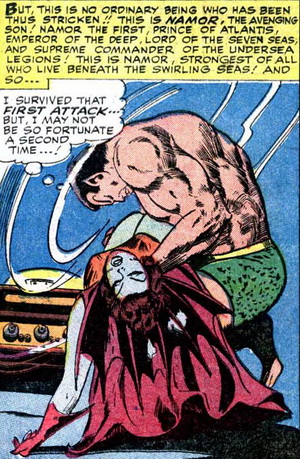
Here the Narrator offers up a rousing poetic defense of the power of Namor as the “strongest of all who live beneath the swirling seas!” But note the weary monarch’s mood. Immediately he thinks, “I survived that first attack…but, I may not be so fortunate a second time!” Maybe Namor didn’t hear the Narrator’s words of praise? Is he losing confidence? Or has he had his fill of Epic Romanticism on this harrowing quest, and is now incorporating a good dose of common-sense reality into his plans? Or is he simply, frankly…exhausted?
When a character contradicts the Narrator, does this count as an existential crisis? Or are the writers merely encouraging us to feel and think and vicariously experience the full scope of emotions? Either way, they’ve hit all the bases in this issue. One Job? Accomplished!
| Want to read this comic on your computer? Marvel has a scan! Want to own the Sub-Mariner story? Buy the Masterworks! Want to own the Hulk story? Buy the Masterworks! |














